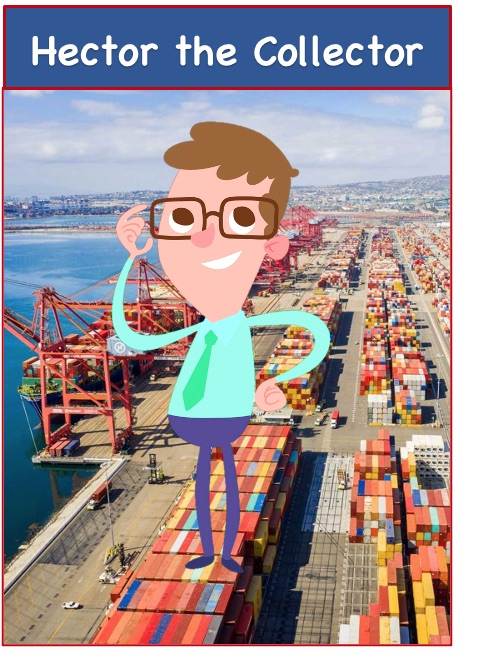
Hi Everyone,
It’s Hector here and hope your summer has begun with a lot of nice weather. Recently, I received an interesting email from a well-known logistics carrier explaining a claim situation that kind of stumped me.
Back in the Spring of 2022, goods were shipped from a manufacturer in Japan, via a ship operator that I’ll refer to as ABC Ship Line. After arriving at the Port of Seattle, the goods were transported to the Tacoma Container Yard, where they awaited customs clearance by the designated Customs Broker.
At the port of Seattle, there was another company, a Document Handler, and their role was merely to turn over the documents (bill of lading and other documents) to the Customs Broker so that the goods could clear customs at the Tacoma Container Yard, and ultimately be transported to the customer. The Document Handler sent all the necessary documents to the Customs Broker by email.
It should be noted that both the Customs Broker and the Document Handler are international logistics companies that provide a multitude of services and roles for every part of the transportation process.
For reasons unknown, the Customs Broker failed to clear the goods through customs at the Tacoma Container Yard within the allowable 14-day storage period, which resulted in demurrage fees (storage charges) totaling $18,970.00 to be incurred.
At the 14-day point, the goods were classified as “abandoned” and further transported from the Tacoma Container Yard to another storage location called General Order (GO), where they continued to accrue storage charges.
At this point, the Customs Broker paid for the GO storage charges in order to transport the goods to the customer. By paying the GO storage charges, the Customs Broker understood that the goods had previously been at the Tacoma Container Yard for 14 days, incurred demurrage fees, and were classified as “abandoned.”
The problem is that the ship operator, ABC Ship Line, was the entity being charged the demurrage fees by the Tacoma Container Yard. Even though the delay in clearing customs was not their fault, they in turn demanded that the Document Handler pay for the demurrage fees. The reason they did this is because they were transporting other goods in progress on behalf of the Document Handler, and indicated that they would not allow this set of goods to be unloaded at the port of Seattle until the current demurrage fees where paid. In other words, ABC Ship Line was using whatever leverage they had against whichever party would pay for the demurrage fees.
Based on this demand and in order for the Document Handler to not damage its relationship and creditworthiness with ABC Ship Line, the Document Handler paid the demurrage fees. Subsequently, the Document Handler is now requesting that the Customs Broker reimburse them for the demurrage fees, which was essentially paid on their behalf. This request is being made knowing that there is no contract with the Customs Broker in place to take responsibility for any demurrage fees.
The Document Handler made several attempts by email and phone to try and communicate with the Customs Broker in order to:
- Have them move the goods through customs at the Tacoma Container Yard on a timely basis.
- Explain why they failed to move the goods through customs at the Tacoma Container Yard.
- Acknowledge that the Document Handler paid the demurrage fees on their behalf in order to maintain its relationship with ABC Ship Line.
In the end, the Document Handler received an email from one of the managers at the Customs Broker stating, “Our company has fulfilled all of its obligations concerning customs clearance of the goods and the file is now closed.”
Upon receipt of this email, I was contacted for my advice. My first thought was to move way past this manager and far up the chain of command, even if it takes going all the way to the CEO and CFO of this Fortune 500 company.
Since both logistic carriers are huge international organizations that provide the same kinds of services, but at different points along the transportation process, it’s very possible that one day the shoe will be on the other foot. Namely, the Document Handler will be providing customs clearance for the Customs Broker, who will be requested to only turnover documents.
In the spirit of cooperation, it would behoove all the parties involved to understand why the goods were not cleared at the Tacoma Container Yard during the 14-day period, which led to the demurrage fees being assessed in the first place.
Many times, we think that we can’t go to the top of an organization to try and rectify a problem. We feel that the top executives are way too busy and would not be in a position to deal with this matter. But my perspective is that if someone is not responding to our legitimate requests in a way that we feel is appropriate, we have to continue to take it up the ladder until hopefully we get a response that is satisfactory.
Hope you stayed with me during this somewhat complicated claim scenario. I’ll let you know the next time what the outcome may be.
Hector the Collector is a credit, collection, and human resources advice column by Nancy Seiverd President CMI Credit Mediators Inc. Your thoughts and comments (nseiverd@cmiweb.com) are most welcome!
All Rights Reserved

